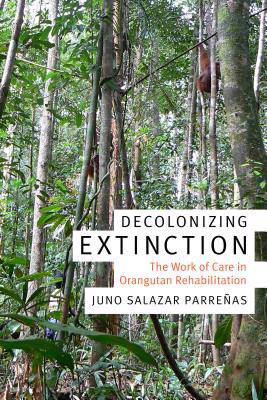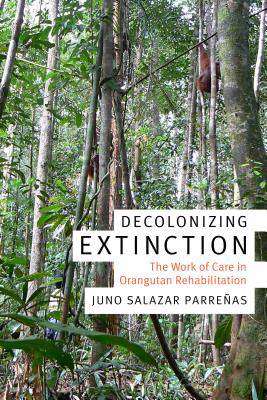
- Afhalen na 1 uur in een winkel met voorraad
- Gratis thuislevering in België vanaf € 30
- Ruim aanbod met 7 miljoen producten
- Afhalen na 1 uur in een winkel met voorraad
- Gratis thuislevering in België vanaf € 30
- Ruim aanbod met 7 miljoen producten
Zoeken
€ 165,95
+ 331 punten
Uitvoering
Omschrijving
In Decolonizing Extinction Juno Salazar Parreñas ethnographically traces the ways in which colonialism, decolonization, and indigeneity shape relations that form more-than-human worlds at orangutan rehabilitation centers on Borneo. Parreñas tells the interweaving stories of wildlife workers and the centers' endangered animals while demonstrating the inseparability of risk and futurity from orangutan care. Drawing on anthropology, primatology, Southeast Asian history, gender studies, queer theory, and science and technology studies, Parreñas suggests that examining workers' care for these semi-wild apes can serve as a basis for cultivating mutual but unequal vulnerability in an era of annihilation. Only by considering rehabilitation from perspectives thus far ignored, Parreñas contends, could conservation biology turn away from ultimately violent investments in population growth and embrace a feminist sense of welfare, even if it means experiencing loss and pain.
Specificaties
Betrokkenen
- Auteur(s):
- Uitgeverij:
Inhoud
- Aantal bladzijden:
- 288
- Taal:
- Engels
- Reeks:
Eigenschappen
- Productcode (EAN):
- 9780822370628
- Verschijningsdatum:
- 20/08/2018
- Uitvoering:
- Hardcover
- Formaat:
- Genaaid
- Afmetingen:
- 150 mm x 229 mm
- Gewicht:
- 521 g

Alleen bij Standaard Boekhandel
+ 331 punten op je klantenkaart van Standaard Boekhandel
Beoordelingen
We publiceren alleen reviews die voldoen aan de voorwaarden voor reviews. Bekijk onze voorwaarden voor reviews.











